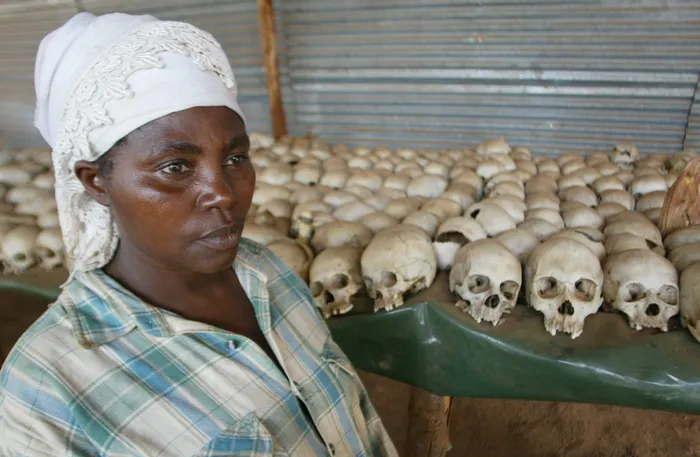Rwanda Genocide: Butcher of Gikongoro’s Sentencing a Bitter Sweet Moment for Survivors

Picture: Karel Prinsloo/AP – Rwanda genocide survivor Dancilla Nyirabazungu stands next to human skulls at the Ntarama church in Nyamata south of Kigali where up to 5,000 people were killed during the 1994 massacre. A Paris Criminal Court has sentenced Prefecture Laurent Bucyibaruta to 20 years in jail for his role in the Rwanda genocide.
By Chad Williams
AS the people of Rwanda, home of one of the world’s most horrific human rights atrocities, the Rwanda Genocide, mark the 28th anniversary of the massacre, a Paris Criminal Court sentenced former Prefect of Gikongoro Prefecture Laurent Bucyibaruta to 20 years in jail for his role in the Rwanda genocide.
Bucyibaruta, who has been in this court for the past two months, was found guilty of complicity in the massacre of Tutsi at Kibeho secondary school, Marie Merci, where killings targeted Tutsi students between April 14 and 16.
The former Rwandan prefect is accused of aiding and abetting the genocide that left hundreds of thousands of people dead in the country back in 1994.
The prosecution sought a life sentence for the man who is responsible for the death of thousands in the former Gikongoro Prefecture in southern Rwanda, where he was the prefect, local media in Rwanda have written this week.
Almost three decades on, what significance does the French court sentencing a former ‘Genocide commander’ have on family members of the Tutsi minority ethnic group, as well as some moderate Hutu and Twa persons, who were killed by armed militias, who were wiped out like nothing?
Genocide survivors have said there is little to celebrate considering what they have lost during the heinous massacre, “but nevertheless, this sentencing is an indication that the truth will always prevail,” Ahishakiye told AFP, calling for other genocide fugitives who have found safe haven in Europe to face justice.
“It is a strong indication that the political will by France to pursue justice against genocide fugitives is positively changing,” said Naphtal Ahishakiye, executive secretary of Ibuka, the Rwandan umbrella support group for genocide survivors.
A Rwandan genocide survivors’ group said Wednesday it welcomed the jailing in France of a former top official convicted of a role in the 1994 slaughter as a “strong” message.
But make no mistake about it, Rwandan Genocide survivors are angry.
They want justice for those who have evaded justice for so many years.
Meanwhile, in recent years, the Rwandan government has requested or signed extradition treaties with dozens of countries in an attempt to have remaining genocide suspects returned for trial in Rwanda, although there are persistent concerns about failure to uphold fair trial standards in domestic atrocity trials, argues Human Rights Watch,
In July, Venant Rutunga, 72, was extradited from the Netherlands to Rwanda, to stand trial on three charges, including playing a role in the genocide, complicity in killing, and crimes against humanity, according to Rwanda’s National Public Prosecution Authority.
In April, Beatrice Munyenyezi was deported by the United States after serving a prison term for lying on her naturalisation application, and arrested upon arrival in Rwanda. She faces seven charges related to the 1994 genocide, including rape.
After decades of tense relations between France and Rwanda, in March, a commission established by President Emmanuel Macron to investigate France’s role in the 1994 killings published a 1,200-page report concluding that France had responsibilities it characterised as “serious and overwhelming,” including for being blind to the preparation of the genocide and being slow to break with the government orchestrating it, a Human Rights Watch article revealed this year.
A report commissioned by the Rwandan government concluded in April that the French government “bears significant responsibility for enabling a foreseeable genocide”.
Twenty-eight years after the 1994 genocide, a significant number of people responsible for the mass killings, including former high-level government officials and other key figures, have been brought to justice.
Also known as the genocide against the Tutsi, it occurred between April 7 and July 15, 1994 during the Rwandan Civil War. During this period of about 100 days, members of the Tutsi minority ethnic group, as well as some moderate Hutu and Twa, were killed by armed militias.
According to online news outlet The East African, at the heart of the case against the 78-year-old were several “security” meetings, either ordered or attended by Bucyibaruta, which prosecutors had argued were actually planning sessions for the killings.
This follows the closing of the case last week, where the prosecution sought a life sentence for the man who is responsible for the death of thousands in the former Gikongoro Prefecture in southern Rwanda, where he was the prefect, says Rwanda’s The New Times.
Local media in Rwanda says that Bucyibaruta, who has been dubbed by survivors “the Butcher of Gikongoro” is specifically accused of masterminding the massacres of Tutsis in Murambi, Cyanika, Kaduha and Kibeho.
Particularly, in Murambi over 50,000 Tutsis were exterminated on Bucyibaruta’s command, making it one of the most horrific killing grounds during the 100-day massacre, according to The New Times.
But for those family members who grew up with the scars and memories of this heinous crime against humanity and what it robbed their children from, right now, the people of Rwanda deserve justice, and reparations.
Williams is a multimedia journalist at the African News Agency (ANA).